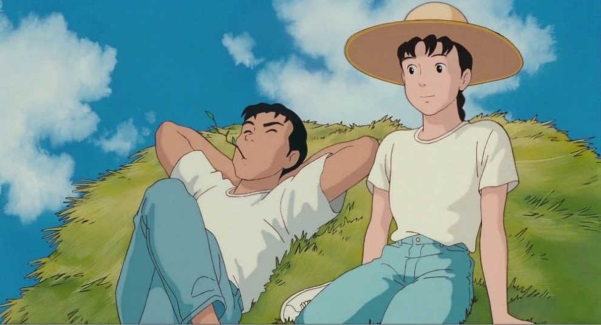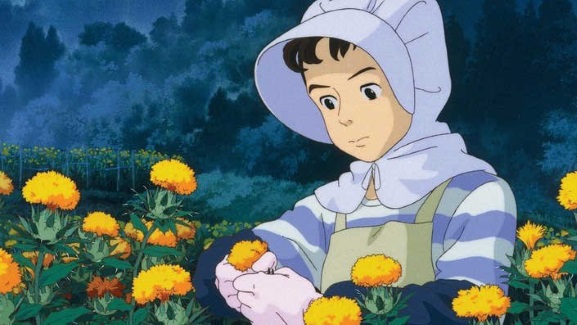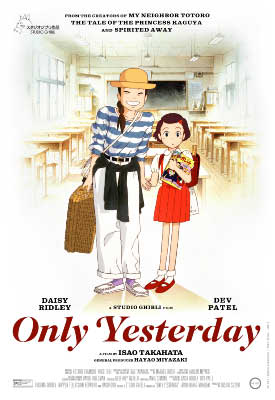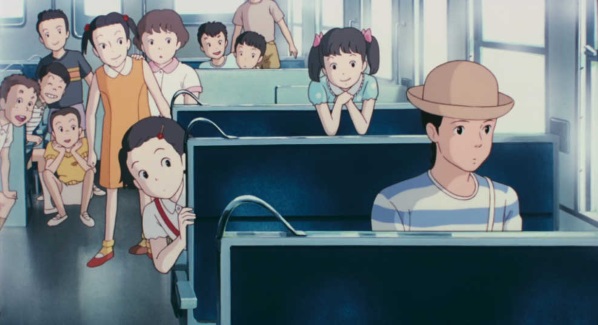This sweet nostalgic film out of Studio
Ghibli found its way into the hearts of the Japanese audience in 1991 and
was the top film at the box office. Yet it was one of their last films to
make it out of Japan and you can see why they probably thought it would not
culturally translate that well. It is very steeped in the culture, nostalgia
and love for the true Japan - the countryside, the farms, the fields. The
film at times seems like it is chastising Japan for deserting rural Japan
for the cities and paints an idyllic picture of the farming communities.
It refers to the emptying out of that society - fewer children in the schools,
hard to find a mate, a tough life that takes its toll, the magnet that is
Tokyo. That is the underlying message that director Isao Takahata weaves
into this story about a young woman who comes to love visiting the countryside.
But that is only part of it as she reminisces about when she was ten-years
old in a series of flashbacks that are touching and amusing. At 2-hours this
is a bit long for an animated feature, but I would not know what to cut.
The translation from the Japanese title is Memories Come Tumbling Down which
is more apt.

Takahara was the lesser-known founder of Ghibli studio, but he contributed
quite a bit as the producer and occasional director of their films. He and
Hayao Miyazaki went far back as they had both worked on the same projects
for other film studios. Takahara had directed The Great Adventure of Horus
with Miyazaki as the main animator and they both worked on the Lupin III
TV series, 3000 Leagues in Search of Mother, Heidi, Girl of the Alps, Panda
Go Panda - and so when Miyazaki decided to form his own studio in 1985, he
brought Takahara with him. It was successful right from the beginning with
Castle in the Sky, My Neighbor Totoro, Kiki's Delivery Service (all from
Miyazaki), the astonishing Grave of the Fireflies from Takahara (based to
some degree on his town being bombed during WW 2) and then this film. Takahara's
other films for Ghibli are Pom Poko, My Neighbors the Yamadas and The Tale
of the Princess Kaguya. Family whether people or raccoon dogs (Tanuki) seem
to play a large part in his films.

This is all about family - the one you are born into and the one you feel
at home with. Taeko is 27 and working in a corporation in Tokyo. She has
a love for the countryside though and her mind wanders back to when she was
ten and tried to talk her mother into going to the country on a vacation.
Instead, she is packed off with her grandmother to Atami, famous for its
hot springs. Taeko's mind is in a flux of indecision - she just turned down
a proposal, doesn't love her job and has no path to follow. All along she
keeps going back to her 10-year-old self - the much younger daughter of three
who battles fractions, desires a pineapple, deals with a boy who has a crush
on her, aghast with the knowledge of periods to come and a family that loves
her but worries about her lack of direction. These recollections are rather
wonderful and funny.

When she has a vacation, she goes to stay with a family in the country and
work on the farm. She just wants the experience of hard manual work, of putting
her hands into the earth, of seeing things grow. One of the family's crops
are Safflowers - using them for dye that goes far back in Japan's history.
Interesting to read about. She becomes good friends with Toshio, a young
man who is into organic farming and speaks of the earth and the surrounding
lands with passion. Her two weeks pass quickly and it is time to go. Then
the elderly grandmother asks, "wouldn't you rather live here?". It is lovely
- the animation is interesting - while in the city it is fairly plain but
as soon as Taeko gets on the train and watches the passing landscapes it
bursts into color and beauty.





